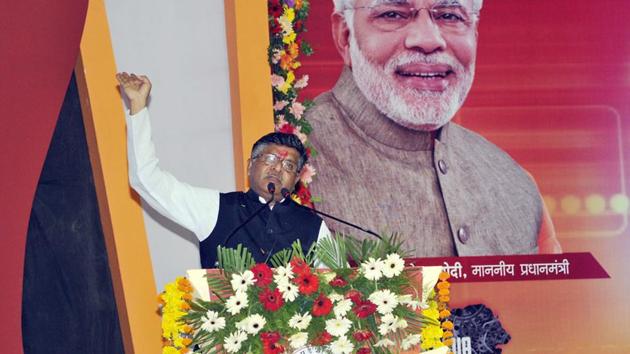Law minister Ravi Shankar Prasad pitches all-India test for lower judiciary
Union minister for law and justice Ravi Shankar Prasad proposed a national level entrance test for “talent infusion” into the lower judiciary
Blaming the higher judiciary for vacancies in the subordinate judiciary, Union minister for law and justice Ravi Shankar Prasad on Monday proposed a national level entrance test for “talent infusion” into the lower judiciary.

“Neither the government of India nor the state governments have a role to play in these vacancies,” Prasad said, as he pointed out to the nearly 5,000 posts of judicial officers lying vacant across the country.
Clarifying that he was not pitching for a national level judicial service on the lines of the all-India services like the Indian Administrative Service and Indian Police Service, the minister said the examination would allow the pool of talented young lawyers who graduate every year from national law universities get into the judicial service. “It should be a robust all-India competition to get the best talent,” he added.
Prasad was speaking at the launch of the website and mobile app for Nyaya Vikas – a programme launched by the law ministry to monitor the progress of development of judicial infrastructure in real time. The app and website were developed by the Indian Space Research Organisation (Isro), using remote sensing technology.
Appointments to the lower judiciary in the states are made by the respective high courts either directly or with the help of state public service commissions. The government has in the past proposed an all-India judicial service involving the Union Public Service Commission – a statutory and autonomous body responsible for recruitments to all-India services and military services.
On the differences of top Supreme Court judges with the Chief Justice of India that came to the fore with an unprecedented press conference on January 12, Prasad said the judiciary had enough “foresight and statesmanship” to settle the differences within. “I would urge the political process to remain as immune as possible from this process. Judges will come, judges will go, but the institution of judiciary has to remain. And we must respect their institutional integrity,” he said.
Without naming the Congress, Prasad said parties that lost elections were using courts to hit out at the ruling party through “sponsored litigation”.
The government had recently come under attack by the opposition when it returned a collegium recommendation to elevate Uttarakhand high court chief justice KM Joseph to the Supreme Court, citing seniority and regional imbalance. “Even in the collegium system (of appointing judges), the right of the government to seek reconsideration and provide inputs is recognised,” Prasad asserted.






